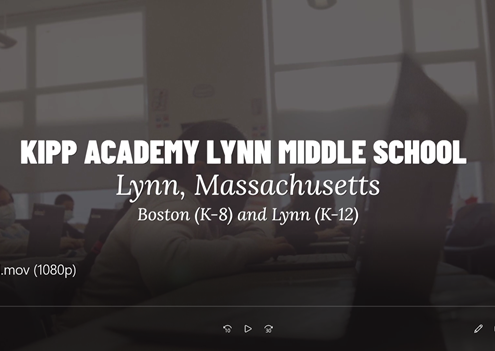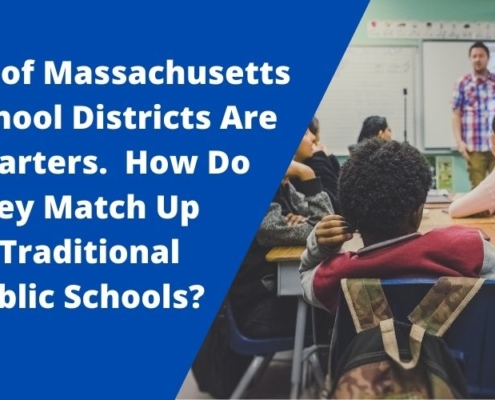New Book on Massachusetts Charter Public Schools Touts Record of Achievement, Minimal Impact on District Finances
Recommendations Include Promoting Innovation, Removing Limits on Growth
Read coverage in The 74 Million: “Author of ‘The Fight for the Best Charter Public Schools in the Nation’ Talks Confronting Hard Truths About Growing Massachusetts Charters” and “Book Excerpt: Former Massachusetts Gov. Weld & State Sen. Birmingham on Lessons Learned From the Fight Over America’s Best Charter Schools”
Read Cara Candal’s op-ed in EducationNext: “The Fight for the Best Charter Schools in the Country: What Massachusetts Got Right and Wrong”
BOSTON, MA – October 16, 2018 – Massachusetts has the best-performing charter public schools in the country, but the sector is also among the nation’s slowest growing, hampered by state laws and regulations that limit their expansion and inhibit new models from being created in the lowest-performing school districts. New state policies should be approved to remove legislative limits that stunt their growth and reduce regulations that restrict autonomy and innovation, according to a new book published by Pioneer Institute.
WATCH: Livestream video recording of book release event:
“For our state to allow more parents to make their own decisions about what’s best for their children’s education, as the drafters of the Commonwealth’s Education Reform Act intended, policymakers must let charter schools grow and charter leaders innovate,” said Dr. Cara Candal, author of The Fight for the Best Charter Public Schools in the Nation.
Information about the book can be found here: https://pioneerinstitute.org/bestchartersbook/
The combination of real autonomy and strict accountability has been the centerpiece of charter schools’ academic success in Massachusetts. Autonomy allows charters to organize around a distinct approach or mission; utilize time, money and other resources to benefit students; recruit and develop talent; and extend the school day and year.
Since the first Massachusetts charter schools opened in 1995, five have had their charters revoked and two more charters were not renewed.
Video: “What are the lessons from Massachusetts charter schools?”
Strong academic performance
The combination of autonomy and accountability has yielded schools that dramatically outperform their district counterparts on MCAS and are particularly effective at meeting the needs of low-income and minority students.
A study from Stanford University’s Center for Research on Educational Outcomes found that a year in a Massachusetts charter school adds 40 days of additional learning in math and 28 days in reading compared to the schools from which the students came.
Studies from MIT and the Massachusetts Department of Elementary and Secondary Education (DESE) found that charter attrition is the same or lower than in district schools and the MIT study found that attendance at Boston’s charter schools has large positive effects for students with a diverse range of special needs.
Dr. Candal writes that while MCAS results are important, policymakers should also focus on measures like graduation and dropout rates, college-going and persistence, and the number of Advanced Placement tests taken and passed.
Studies find that Boston charter schools have a higher graduation rate and lower dropout rate than the Boston Public Schools (BPS). Charter students also score higher on SATs and are more likely to attend four-year rather than two-year colleges.
There were more than 25,000 unique students on Massachusetts charter school waitlists for the 2017-18 school year.
Funding
The Massachusetts charter school funding formula is fair to charters and districts, and includes a unique reimbursement program that provides districts with refunds for money allocated to charters. Massachusetts is one of few states that offers such reimbursement. Under state law, districts receive a 100 percent refund in the year after a student leaves, then 25 percent in each of the next five years. These refunds do not happen when students leave for vocational, parochial or private schools, or other districts.
Dr. Candal praises the funding formula for closely tracking the actual cost of educating students. It adjusts the allocation based on a student’s grade level, whether s/he is economically disadvantaged or an English language learner (ELL). This approach underscores the fact that education dollars fund students, not a particular school or district.
Dr. Candal recommends that the Commonwealth adopt the same approach for special needs students. Currently, charter school tuition is not adjusted depending on how many special needs students charters enroll. Statewide, charters enroll generally the same percentage of special needs children as districts, but the percentages vary among individual schools. A change in the formula could adjust tuition for actual enrollment.
While funding is ground zero for political battles over charter schools in Massachusetts, Dr. Candal finds that their actual financial impact is small. In recent years, half the districts that have seen large increases in the number of students leaving for charters are so-called foundation districts, in which state aid covers most of the cost of education anyway. In these districts, charters’ financial impact is negligible.
Any negative financial impact is concentrated in a few “above-foundation” districts that have recently seen large outflows of students to charter schools.
The biggest funding challenge for charter schools is capital costs. Charters receive an $893 annual per-pupil facilities payment that is far less than what district schools get. The average charter school spends more than twice that amount on facilities. The state provides generous subsidies of up to 85 percent of the cost of district facilities.
Teacher recruitment and retention
A major impact of having to divert operating dollars to cover capital expenses is that charter schools cannot match district teacher salaries. While BPS teacher salaries averaged about $90,000 in 2016-17, teachers at Boston charters earned around $55,000.
To make up for this deficit, charter schools invest heavily in teacher induction, development and evaluation. Both the Match and Edward Brooke charter networks have very competitive teacher induction programs. Many charter schools have feedback and growth-oriented teacher evaluation systems.
A 2010 state law raised the cap on the number of charter schools in the Commonwealth’s lowest-performing districts but required that any charter seats in excess of the previous cap be offered by “proven providers” – charter operators who already have a record of success in Massachusetts.
While this restriction allowed the most successful charter school operators to expand in the lowest-performing districts, it prevented “new” charter operators from applying to open schools in those districts. This has limited the pool of applicants and impeded those who may bring new, innovative educational models to these districts. With limited opportunities to start new schools and little ability to implement innovative new concepts, some dynamic charter leaders are taking their ideas to more welcoming environments.
Regulatory creep
The 2010 legislation included provisions that impose new regulations on charter public schools, symbolizing a move away from the autonomy that has been at the heart of charter schools’ success.
“With charters dramatically outperforming traditional public schools, the determination of Massachusetts policymakers to make charters resemble district schools, rather than the other way around, is incomprehensible,” said Pioneer Executive Director Jim Stergios.
Recommendations
Among the finance-related recommendations Dr. Candal makes are:
- Simplify the Commonwealth’s K-12 education funding law and make it more transparent
- Fully fund charter school reimbursements
- Make facilities funding more equitable by providing charters with more capital money or access to unused public-school buildings
Other recommendations include:
- Raise or abolish the cap on charter schools
- Leave room under any cap for innovative school models
- Adopt a regulatory approach that favors diversity and competence over replication and compliance
- Create incentives for charter schools to expand into suburban and rural areas
Finally, Dr. Candal calls for moving the charter authorization process from DESE and the Board of Elementary and Secondary Education to an independent charter school board committed to supporting and growing the sector. DESE’s Charter School Office would also move to work under the new board.
Learn more about the book at https://pioneerinstitute.org/bestchartersbook/. There will be an event at 6:00 pm ET discussing the book which will be live streamed here.
About the Author
Cara Stillings Candal is an education policy expert and Senior Fellow at Pioneer Institute. She was formerly research assistant professor at the Boston University School of Education and has an extensive background in national and international education policy and teacher training. Candal is the author/editor of numerous articles and several books about charter schools and other alternatives to traditional school options.
About Pioneer
Pioneer Institute is an independent, non-partisan, privately funded research organization that seeks to improve the quality of life in Massachusetts through civic discourse and intellectually rigorous, data-driven public policy solutions based on free market principles, individual liberty and responsibility, and the ideal of effective, limited and accountable government.
Learn more about how you can help expand access to charter schools
Related Posts:





















